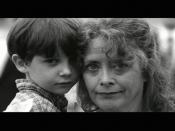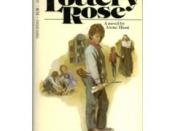�PAGE � �PAGE �3�
A Comparative Analysis of "The Lottery"
Perhaps it would be best to classify "The Lottery" as a deceptive little horror story. Violence is a major theme in "The Lottery." While the stoning is a cruel and brutal act, Jackson enhances its emotional impact by setting the story in a seemingly civilized and peaceful society. This suggests that horrifying acts of violence can take place anywhere at anytime, and they can be committed by the most ordinary people. Jackson also addresses the psychology behind mass cruelty by presenting a community whose citizens refuse to stand as individuals and oppose the lottery and who instead unquestioningly take part in the killing of an innocent and accepted member of their village with no apparent grief of remorse.
Linda Wagner-Martin, a critic, wrote a critical essay to one of many Shirley Jackson's short storis, "The Lottery." When it was published in "The New Yorker", "mail at the magazine was heavy with readers' reactions to the calmly objective recounting of the ritualized murder of the unlucky housewife and mother, Tessie Hutchinson" (Wagner-Martin). Linda Wagner-Martin thinks that Jackson wrote this in a different tone than her other stories, "its tone resembles that of 'The Lottery' in its gradual accumulation of relentless-yet seemingly harmless-details", making the reader believe that everything is great (Wagner-Martin). The townspeople simply seem to appreciate the beautiful day of June 27th. This seems to be a normal gathering of people in small village, where community is interacting with each other, laughter heard, happiness. Children and other members of community are gathering stones, different kind of stones in their pockets and in the corner, awaiting the ritual drawing.
The leader Mr. Summers and his assistant Mr. Graves are in charge...


